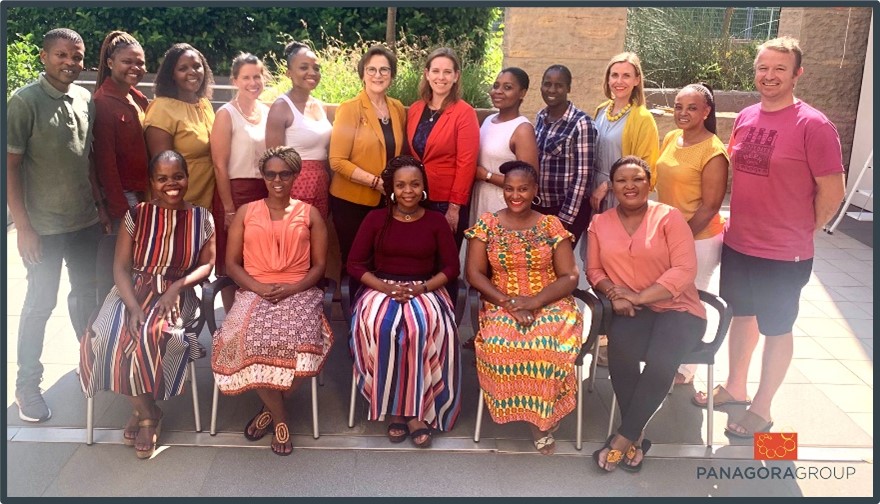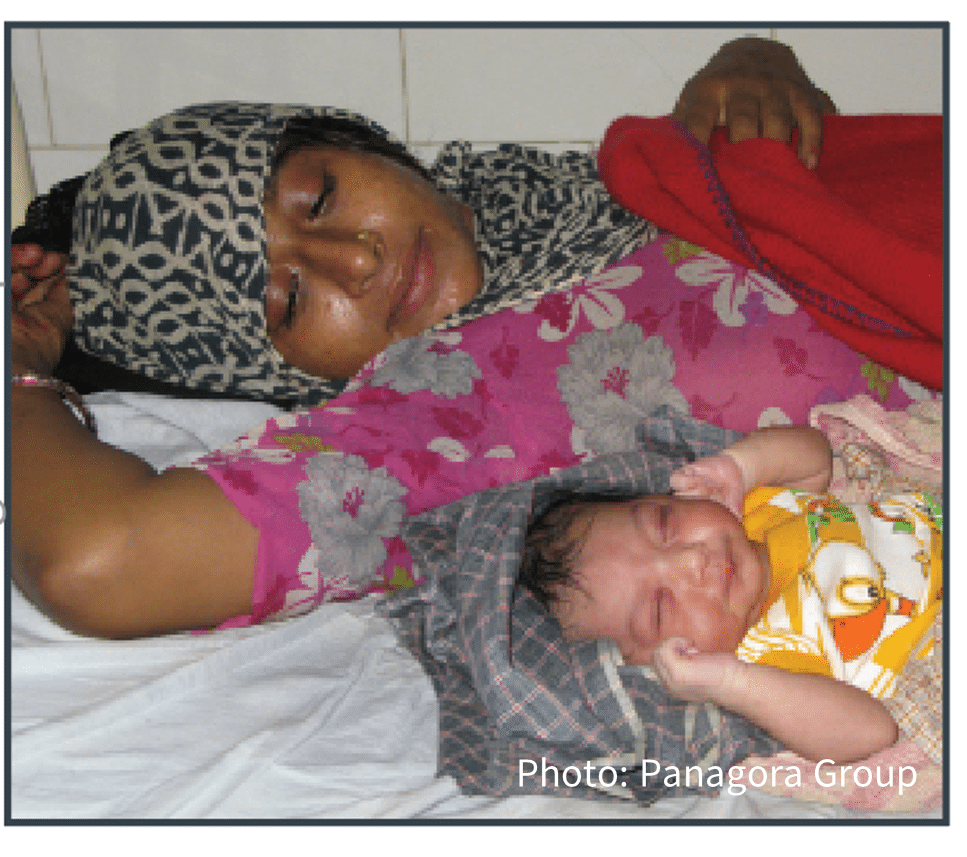Locally-led development matters, now more than ever. For much of the past two decades, U.S. small businesses have been at the forefront of locally-led development. They are the right size to work with local partners because they understand the size, scope, and capacity issues that local partners often face.
Since 2011, Panagora Group has been a hands-on partner to USAID for locally-led development. We employ inclusive development approaches to build and strengthen the capacity of local partners, and drive innovation in social enterprises, franchising models, and local private sector development.
Through our work in and support over 50 countries in Asia, Africa, and the Americas, we have been steadfast in our engagement with local partners—whether ministries, networks, organizations, or private sector actors—to support their efforts to identify opportunities, develop strategies, implement plans, and mobilize resources.
We have seen first-hand how engaging these local stakeholders has paved the way for more inclusive, equitable, and sustainable development outcomes.
Because Panagora is a small business, it is also nimble, quick to mobilize, and knows the impediments that small business face in enterprise-led development.
These include challenges expanding into new markets, managing growth, and accessing capital. We know how to strengthen local partners to be “implementation-ready” as well as “USAID contract-ready.”
We applaud USAID’s commitment to locally led development. On the following pages, please see Panagora project profiles that highlight our impact in locally led development.
USAID/South Africa’s Health Office
Project: Technical Support Services (TSS) Activity
USAID Local Implementers: Anova Health Institute, BroadReach, MatCH, Right to Care, and WRHI

TSS assists USAID/South Africa’s Health Office in determining technical priorities and developing creative, innovative solutions for strategically allocating resources, strengthening connections with partners, and replicating best practices and efficient models in seven countries. USAID’s Siyenza campaign supports South Africa’s National Department of Health in retaining people living with HIV who are already receiving care and extending antiretroviral therapy (ART) to two million more.
Localization: Working closely with USAID, Panagora has supported five local IPs that are providing HIV and TB services in 15 districts (in 65 clusters) throughout South Africa. USAID and Panagora advisors worked with local partners to identify challenges and limitations to HIV and TB service delivery, engaged with teams to develop actions to address them, enhanced data tracking and knowledge management systems, and implemented continuous improvement management techniques.
To strengthen local partner capacity, TSS worked with Anova, a USAID IP managing the largest care and treatment portfolio, to scale its structures and systems for rapid expansion in 2019, as well as scale down its workforce in three provinces (Gauteng, Limpopo, and Western Cape) between 2020 and 2021 based on program changes. This included assistance with streamlining Anova’s organizational structure and standardizing roles and responsibilities; reinforcing efficient and consistent management and operations; and facilitating optimal performance and sustained service delivery.
Impact: Thanks to TSS’ organizational development support, Anova is better able to manage their USAID funding and provide better quality care and treatment.
USAID/Bangladesh
Project: Smiling Sun Franchise Program
Local Implementers: 26 Bangladeshi NGOs
 Under USAID/Bangladesh’s Smiling Sun Franchise Program (SSFP)—now known as the Surjer Hashi Network—and as a subcontractor to Chemonics, Panagora worked closely with local partner, Capacity Building Services Group (CBSG), to provide organizational development, business planning, implementation, and mentoring support to 26 Bangladeshi health care NGOs. Out of the 26 we worked with, we provided specialized support to the ten highest-performing NGOs.
Under USAID/Bangladesh’s Smiling Sun Franchise Program (SSFP)—now known as the Surjer Hashi Network—and as a subcontractor to Chemonics, Panagora worked closely with local partner, Capacity Building Services Group (CBSG), to provide organizational development, business planning, implementation, and mentoring support to 26 Bangladeshi health care NGOs. Out of the 26 we worked with, we provided specialized support to the ten highest-performing NGOs.
Localization: Panagora and CBSG conducted rapid organizational self-assessments for the NGOs, including their networks of 325 health clinics, 8,800 mobile clinics, and 6,400 community-based workers. We employed a highly participatory approach to ensure the level of engagement and ownership that is necessary to achieve successful organizational change. Based on the results, our team implemented a network-wide strengthening plan that featured applied training and an innovative and systematic mentoring and coaching program. Through a very focused approach, we tripled the target number of local NGOs and organizations able to receive direct awards.
Impact: From this work, The Smiling Sun activity went through many iterations and eventually became the Surjer Hashi Network, a private entity that operates approximately 100 clinics directly with no NGO involvement.
The work we did with these NGOs resulted in long-term sustainable outcomes even after the project and its funding model changed. Out of the ten high-performing NGOs we worked with to do specialized capacity strengthening, five have continued on a growth trajectory to scale and expand their health and other programs. They have increased their footprint in urban health and diversified their donor funding base, now working closely with the government of Bangladesh. These organizations reach thousands of people across Bangladesh.
The relationship between Panagora, a woman-owned small business, and CBSG, a small Bangladeshi entity, helped ensure the dedicated focus and technical expertise that was needed for success. We introduced CBSG as a new partner to the USAID contract network and through strategic partnership, CBSG has grown significantly, becoming a regular go-to USAID contractor for implementing organizations like Abt Associates, ACDI/VOCA, Chemonics, DAI, and Winrock, as well as bi-lateral and multi-lateral institutions.
USAID/Colombia
Project: Monitoring, Evaluation and Learning (MEL) activity
Local Implementers: Sistemas Especializados de Informacion (SEI), Ipsos Napoleón Franco & CIA (IPSOS), Centro Nacional de Consultoría (CNC), Jaime Arteaga y Associados, Fundación Creata, Isegoria, and Cifras y Conceptos
 For USAID/Colombia’s MEL Platform, Panagora has subcontracted seven local partners to conduct technical MEL assignments over the past three years. These include evaluations, assessments, market analyses, and private sector analyses. The local firms have developed fieldwork tools, trained surveyors, implemented data collection, and conducted analyses under Panagora’s technical oversight. They are also tapped into local networks across Colombia and can navigate complex local environments to collect quality data for the MEL activity. One of our local subcontractors, SEI, has been a technical partner to Panagora for nine evaluations since January 2020. We work collaboratively with them to ensure quality deliverables and manage challenges in the field. We also conduct follow-up meetings to discuss successful strategies and lessons learned.
For USAID/Colombia’s MEL Platform, Panagora has subcontracted seven local partners to conduct technical MEL assignments over the past three years. These include evaluations, assessments, market analyses, and private sector analyses. The local firms have developed fieldwork tools, trained surveyors, implemented data collection, and conducted analyses under Panagora’s technical oversight. They are also tapped into local networks across Colombia and can navigate complex local environments to collect quality data for the MEL activity. One of our local subcontractors, SEI, has been a technical partner to Panagora for nine evaluations since January 2020. We work collaboratively with them to ensure quality deliverables and manage challenges in the field. We also conduct follow-up meetings to discuss successful strategies and lessons learned.
In total, Columbia MEL has committed around $2,788,767 to technical subcontracts so far, with values ranging between $16,778 and $400,000 for each. By working closely with multiple local subcontractors through MEL Platform, Panagora is strengthening their capacity to take on larger contracts in international development. Through our subcontracts with SEI, Panagora has invested in building their knowledge and capacity to develop evaluation data collection designs, instruments, materials, and analysis; flexibly conduct both in-person and remote data collection; and implement a USAID-funded subcontract.
Other Mission-Related Work
USAID/Afghanistan Health Sector Resiliency (HSR)
 As a subcontractor to Palladium Group, Panagora built the capacity and improved the sustainability of local private sector associations, including the Afghan Private Hospital Association and the Afghan Medicines Services Union. Using a highly participatory method to create the type of buy-in that is necessary for successful organizational change, we facilitated capacity assessments and supported the development and implementation of institutional strengthening plans; identified new initiatives to build value propositions to members; strengthened governance structures; and identified areas for increased revenue generation to improve long-term sustainability.
As a subcontractor to Palladium Group, Panagora built the capacity and improved the sustainability of local private sector associations, including the Afghan Private Hospital Association and the Afghan Medicines Services Union. Using a highly participatory method to create the type of buy-in that is necessary for successful organizational change, we facilitated capacity assessments and supported the development and implementation of institutional strengthening plans; identified new initiatives to build value propositions to members; strengthened governance structures; and identified areas for increased revenue generation to improve long-term sustainability.
USAID/Kenya Afya Jijini Activity
IMA World Health subcontracted with Panagora under its USAID/Kenya Afya Jijini work to organize a grant-making and subcontracting program for local partners. This supported health systems strengthening for a range of health services, including HIV/AIDS; FP; MCH; water, sanitation, and hygiene (WASH); and nutrition. Panagora created USAID-compliant manuals, trained IMA’s local staff in grant-making and subcontracting to local entities, and provided them with ongoing technical support. Panagora also assessed four local partners and proposed appropriate approaches for IMA to contract with them.
USAID/Burundi Integrated Health Project
As a subcontractor to FHI360, Panagora led cross-cutting private sector initiatives that were tailored to Burundi’s private sector and health system. We assessed potential private sector initiatives and used a consultative team approach to develop a PPP and private sector strategy. We then designed, negotiated, and initiated two significant PPPs with a leading Burundian mobile phone company to support malaria prevention. We also developed other PPPs to address FP/RH, MCH, HIV/AIDS, TB, and malaria, with special outreach to youth.
Panagora’s CLA and MEL Platforms
Panagora is currently implementing three CLA and three MEL Platforms for USAID in Africa, Asia, and Latin America. Notably, our platform in Southern Africa serves 6 countries. We have also successfully closed out two MEL platforms. In all our platforms, we seek to maximize local partner engagement to ultimately create a sustainable cadre of local MEL service providers that can respond to the range of MEL services that USAID and others require. We typically create a MEL partners’ fund in each country or region for this purpose. For example, under our USAID/Colombia MEL Platform, we have subcontracted with five local partners over the past two years, to carry out such assignments as evaluations, assessments, and private sector analyses; with subcontracts ranging from $45,000 up to $400,000.
Moreover, almost 90 percent of our 120 long-term overseas staff members are host country nationals. We also build MEL capacity among personnel within USAID and its implementing partners—also mostly host country nationals—using targeted on-the-job training and a CLA organizational development assessment tool that measures progress from year to year.